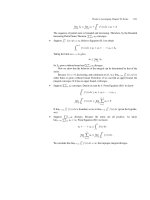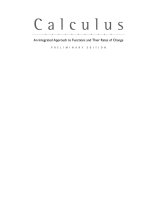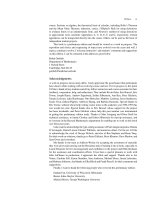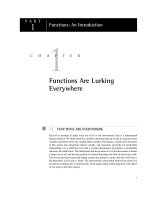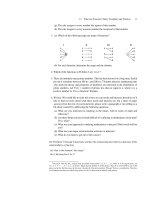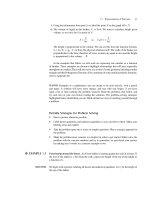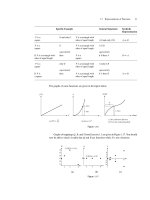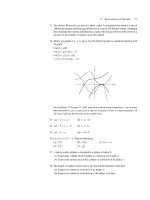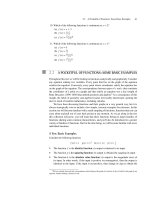The relationship between first-year Nghe An College students' motivation to read and their use of reading strategies
Bạn đang xem bản rút gọn của tài liệu. Xem và tải ngay bản đầy đủ của tài liệu tại đây (583.9 KB, 6 trang )
The relationship between first-year Nghe An
College students' motivation to read and their
use of reading strategies
Đào Thị Minh Hương
Trường Đại học Ngoại Ngữ
Luận văn ThS. Chuyên ngành: English Linguistics; Mã số: 60 22 15
Người hướng dẫn: M.A. Phạm Minh Hiền
Năm bảo vệ: 2010
Keywords: Tiếng Anh; Động từ; Tiếng Việt; Ngữ pháp.
Content:
CHAPTER1: INTRODUCTION
1.1. Rationale of the study
English nowadays has been a language of internationalization so it is taking a very
important role in most fields in personal and professional life as well because of its popularity
in the world. Being a student in the new era. She/he has not only opportunities to approach
scientific and technological achievements but also challenges of being backwards due to
her/his knowledge, and ability.
To master English, the students need to grasp all four skills that are closely related to
one another: Listening, speaking, reading and writing. Among these skills, reading is an
important one because it does not only help student develop other language skills, but also
provides them knowledge on the target language. According to Byrne,“reading is an
important way of expanding the students’ receptive knowledge of the language and in terms
of classroom activities, it is an effective way of simulating students to talk and write”. As we
read, we go back to the time, pass across the oceans and barriers of language, religions and
cultures. Through reading, we can escape into the mind of a philosopher, observe with a
scientist, stay with scholar, analyze with a critic and live through a novel or a play.
Reading is one of the most important skills in learning English. Being a teacher of
English at Nghe An college, I realized that most of students face many problems in learning
reading. This is due to the fact that reading lesson is so boring that student often feel tired and
stressed. Students often experience the lack of reading strategies which are essential for them
to overcome the challenges in the classroom so motivation is one of the key factors that
determine student ’success or failure in language learning. One of the major concerns of
educators and parents is motivating students so that they work at the best of their abilities (
Guthrie, Solomon 1997). The key is to motivate them in such a way that they want to do the
task that we are assigning .For this reason, I decided on choosing “The relationship between
first –year Nghe An college students’ motivation to read and their use of reading strategies”
1.2. Aims of the study
* To identify types of motivation possessed by the first-year-college students in
learning reading
* To investigate some factors affecting students' motivation in learning reading.
* The major purpose of this study is to find out whether there is any relationship
between motivation and use of reading strategies and which type of motivation will influence
students' choice of reading strategies.
1.3. The research questions
1. What are the types of motivation possessed by the first -year -students in reading
learning?
2. Is there a relationship between the types of motivation (integrative motivation and
instrumental motivation) and learners' choice of reading strategies?
3. What are the factors affecting students' motivation in learning reading?
1.4. Scope of the study
Motivation is one of the factors that may maintain a strong influence on the way
language learners use learning strategies. This study, however, is designed to investigate the
relationship between students' motivation to read and their use of reading strategies. Besides,
the sample of the study was drawn from the first –year- students at the Department of
English, NGHE AN college.
1.5. Methods of the study.
To achieve the aims mentioned above, data were collected through the survey
questionnaire.
The quantitative research method is used with the aim of obtaining information on
students’ motivation when they learn reading to find out the relationship between students’
motivation to read and their use of reading strategies.
1.6. Significance of the study
Motivation is one of the key issues in language learning and it has long been believed
to have a good impact on success or failure of a language learners.The study is significant for
the following reason:
It studies types of motivation which are possessed by most of the students in English
Department, Nghe An college
It investigates a relationship between the types of motivation (integrative and
instrumental motivation) and learners' choice of reading strategies.
It points out some suggestions for the teachers to improve the textbook, and some
techniques to help motivate learners.
1.7. Design of the study
The study consists of three main parts: the introduction, the development and the
conclusion.
Chapter 1 introduces rationale, aims of the study, the research questions as well as
scope, significance of the study and methods of the study.
Chapter 2 deals with an overview of the theoretical background of the research. It is
concerned with the issues relevant to the topic of the research motivation and reading
strategies, classification of the reading, motivation in reading, the importance of motivation
in reading, factors affecting students’ motivation in the learning environment, the role of the
teacher and the students in teaching and learning, reading comprehension strategies, the
relationship between motivation and the use of reading strategies.
Chapter 3 presents the method used in the study including situation analysis,
instruments and the procedure of data analysis and shows the detailed results together with a
comprehensive analysis on the data collected from the survey questionnaires
Chapter 4 gives some major findings, discussions of finding, and recommendations
to reading motivation activities and techniques employed by the teachers at NJTTC,
strategies for developing reading skill to first -year -students at Nghe An college
Chapter 5, the last chapter of the study, is the conclusion where all the main contents
of the study are summarized and limitations of the study and suggestions for further studies
are presented.
REFERENCES
1. Ausnbel, David A (1968: 368 - 379). Educationoil. Psychology: A Cognitive view.
Newyork: Holt,Rinehart and Winston.
2. Brown, H.D (1993;152) Principles of language learning and teaching (3
rd
Ed) NJ:
Prentice Hall
3. Brown.J K (1999:297) Understanding Research in second language learning CUP
4. Carol, J.B (1962). The prediction of success in intensive foreign language trainning.
5. Carell Devine and Eskey (1983: 13). Interactive Approaches to second language reading
Cambridge University Press.
6. Deci, E.L,& Ryan R,M (1985) intrinsic motivation and self –determination in human
behavior. New York: Plenum Press
7. Ehrman, M.E,and oxford, R L (1989) Effects of sex differences, career choice, and
psychological type on adults language learning strategies. Modern Language journal,
73(1),1-13
8. Ellis. (1994: 75). The study of second language Acquisition. Oxford Uni- Press
9. Eccles et all. (1998).In the mind of the actor: The structure of adolescents’ achieve task
values and expectancy –related beliefs
10. Littlewood. (1998). Communicative language teaching, CUP
11. Galluzzo, 2005, p142. Performance assessment and aevuwing teacher education: the
Firo chiaro.
12. Gardener et al. (1985). Social psychology and language learning. The role of attitude and
motivation. London: Edward Armold.
13. Goodman k,s. (1971:135). Reading a psycholinguistic Guessing Game. In Harry singer and
Robert.
14. Harmer. (2001: 51). The practice of English teaching
15. Harmer. (1989: 153). The practicle of English teaching 1
st
ed, longman.
16. Mc Combs, B.L. (1996). Alternative perspectives for motivation. In L. Baker, P
Afflerbarch αD.Reinking (Eds)
17. Matthew Weller, Los Angeles Business Journal, March 14, 2005 Basic principles of
motivation exist that are applicable to learning in any situation
18. Nuttall. (2000:38). Teaching reading skills in a foreign language, Oxford: Heinemann.
19. Smith. (1985: 102). Reading Cambridge University Press.
20. William. (1984:2). Reading in the classroom Macmillan Publishers
21. Jackobovits, Leon A,1970. Foreign language learning: A psycho linguistic analysis of
issues. Newbury House
22. Ray Williams “Top ten” principles for teaching reading EFL journal volume 40/1
January 1986(42-440
23. Ramage, K. (1990). Motinatimal factors and persistence in foreign language study
language. Learning 40, 1-13.
24. Wlodkowki R. J. Enhancing Adult Motivation to learn

